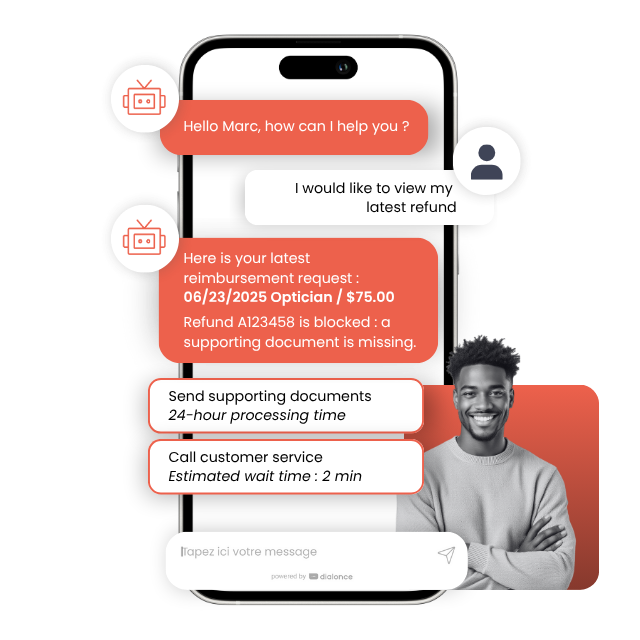Trends
< Back to the blog
As the priorities for Customer Relationship Directors in 2023 shift towards customer empowerment (according to a recent study by Talkdesk*, 85% of customer experience professionals believe that leveraging AI and automation is very important right now), artificial intelligence tools and technologies in the realm of customer relations are in the spotlight!
To gain a better understanding of the challenges and how to adapt these innovations to your customer service, we interviewed Pierre-Eric Marchandet, CTO of DialOnce, and together we delve into the subject.
Certainly! Imagine a customer journey (whether vocal or digital) leading to the customer service. DialOnce captures this flow at the source and ultimately qualifies its intention. If it's a phone call, it is immediately digitized, and the contact is guided, based on their intention and your resource availability, towards another channel for resolution. This journey is 100% seamless and omnichannel.

This figure will certainly speak to you: on average, in a customer service, 80% of requests concern 20% of the recorded contact reasons. Once we understand this, it's clear that there are many interactions for which the response can be automated. Add to this the contact cost for synchronous interactions handled by an advisor, and there you have it! AI can thus be valuable at different levels; both to guide customers based on their contact intentions, provide a relevant answer without an advisor's intervention, help the advisor find the best answer as quickly as possible, or even automate some business processes.
Far from being a lack of attention to the customer, automation by artificial intelligence directly meets strong expectations from customers, advisors, and companies.
Of course!
As a consumer, you know that customers are becoming increasingly demanding. They expect quick and complete answers, on the channel of their choice. For this, it is necessary to provide them with a quality response at the desired time, including outside of business hours or during peak times. The customer will therefore be very happy to enter a self-service program if it is efficient and quickly satisfying.
Moreover, if you are responsible for a contact center, you know how important it is to give autonomy to your customers. The stakes are multiple:
See also our article: What Role for Visual IVR in Automating Customer Service?
For advisors, productivity and average handling time are direct concerns. These are metrics that accompany them every day, and one way to help them improve their performance is to offer them intelligent access tools to the company's knowledge base.
AI can be used in customer relations in various ways. For example, AI chatbot can be used to provide a chatbot service to answer frequently asked questions by customers, or to provide product or content recommendations based on a customer's purchase history or interests. It can also be used to analyze customer relationship data to help companies better understand the needs and preferences of their customers.
In some cases, AI can even be used to completely replace human interactions in customer relations, offering real-time assistance through chatbots or voice recognition systems. However, it is important to note that AI cannot completely replace human interactions in most cases, and it is often better to combine AI with human support to offer a quality customer experience.
I'll give you my point of view... but let's start by asking it directly!
Question Asked to GPT:
Would chat GPT be an asset for customer relations and the detection of a customer's intentions?
"GPT (Generative Pre-training Transformer) is a large-scale language model developed by OpenAI that can autonomously generate text. While GPT can be used to create chatbots capable of answering questions and providing information, it is important to note that GPT is not specifically designed for customer relations or detecting customer intentions."
Response from GPT
I'll let you appreciate the answer...!
From my point of view, for customer relations, it might be more useful to use chatbots that have been specifically designed and trained to understand the needs and preferences of customers, and to provide responses adapted to these needs. These chatbots can use natural language processing (NLP) algorithms to understand the meaning of customers' sentences and questions and to provide relevant responses accordingly.
It is also possible to combine chatbots with intent qualification tools to help better understand the needs and preferences of customers. These tools can use machine learning techniques to analyze customer relationship data, such as conversations with chatbots or purchase history data, and provide valuable insights to companies about their customers' intentions and preferences.
As I mentioned earlier, GPT (Generative Pre-training Transformer) is a large-scale language model that can be used to autonomously generate text, but it is not specifically designed for customer relations or detecting customer intentions.
However, GPT can be used as a valuable resource to boost the customer service knowledge base with numerous contact motifs, expressed in different ways; an extraordinary time saver in training a bot dedicated to customer relations. This is work we have already initiated at DialOnce and will accelerate considerably thanks to Chat GPT's generative AI.
It's important, moreover, to note that for these chatbots to be effective, they must be trained and configured appropriately to understand customers' needs and preferences, and to provide responses adapted to these needs.
Intent qualification is not an easy task and often requires human intervention to be fully effective. Integration with chat-GPT would not be relevant without the years of expertise in intent qualification that are our strength.
In our daily lives, assistants like SIRI are becoming common for controlling home automation tools (music, home security, calls, etc.). Therefore, it's reasonable to think that soon, we might find answers to our questions without even going through a company's customer service, just like we query our speaker!
But for now, artificial intelligence tools for customer relations already offer many possibilities to improve the daily lives of advisors, the customer experience, and the management of the contact center.